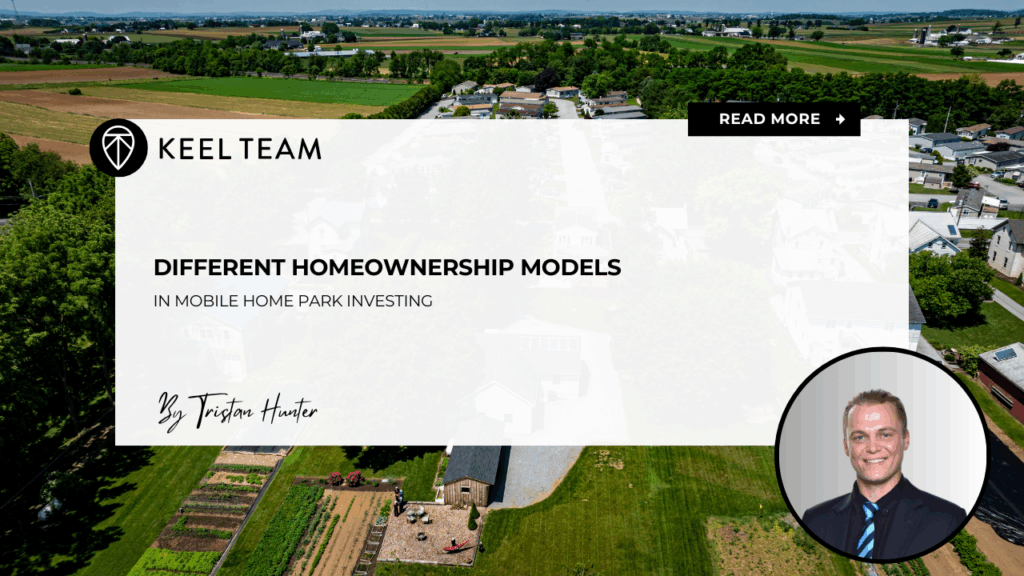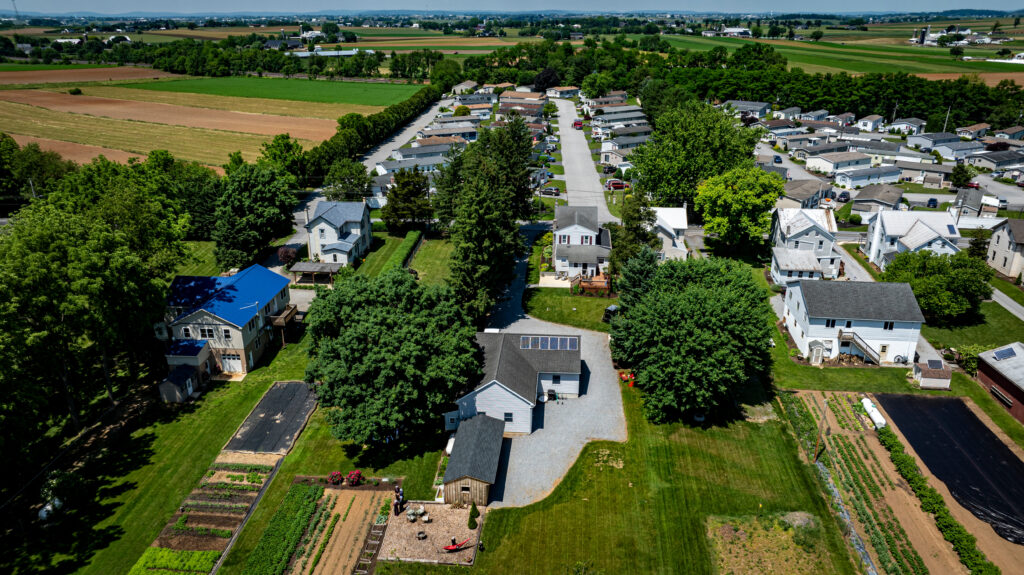Different Homeownership Models in Mobile Home Park Investing
-
 Tristan Hunter - Investor Relations
Tristan Hunter - Investor Relations

Mobile home park investing can take two very different forms: owning the homes themselves or owning only the land the homes sit on. While both models fall under the mobile home park umbrella, they have distinct operational demands, risk profiles, and long-term financial implications.
Understanding how these ownership structures differ helps investors align their strategy with their tolerance for involvement, maintenance, and potential returns.
Understanding Mobile Home Park Ownership Models
At its core, a mobile home park consists of lots (or pads) that are leased to residents who either own or rent the homes on those lots.
The key distinction lies in who owns the mobile homes — the investor (mobile home park-owned homes) or the residents (tenant-owned homes).
These two models shape nearly every aspect of the investment, from maintenance and turnover to financing and community stability.
Owning the Homes: The Mobile Home Park-Owned Model
What It Means
When an investor owns the homes within a mobile home park, they act as both landlord and housing provider. In this setup, the investor leases the homes directly to tenants and is responsible for maintaining both the homes and the underlying lots.
This structure can resemble a multifamily rental model, where the investor controls the physical housing units and collects rent from each household.
Income and Expenses
Because mobile home park-owned homes generate higher gross rent, the income per occupied unit often appears stronger on paper. However, that higher income usually comes with greater operational costs, including:
- Home repairs and replacements
- Appliance and HVAC maintenance
- Turnover costs when tenants move out
- Property management overhead
In other words, the investor receives more rent but must handle the same day-to-day challenges that come with managing physical dwellings — much like an apartment operator.
Download our FREE eBook on the Top 20 things to know BEFORE investing in mobile home parks!
Advantages of Owning the Homes
There can be several reasons investors choose to hold mobile home park-owned homes:
- Faster Lease-Up of Vacant Lots
When a mobile home park has vacant pads, bringing in new homes (whether purchased or financed through programs like 21st Mortgage’s CASH program) can help fill those spaces quickly. This approach may increase occupancy and revenue sooner. - Control Over Quality and Uniformity
By owning the homes, the operator can maintain a consistent standard across the mobile home park — improving curb appeal and potentially supporting higher rent collections. - Potentially Higher Cash Flow
Mobile home park-owned homes typically yield a larger monthly income per lot, although the true profitability depends on keeping maintenance and vacancy costs manageable.
Challenges and Drawbacks
Despite its advantages, the mobile home park-owned model often introduces heavier operational burdens:
- Maintenance Risk – Homes depreciate and require ongoing repairs, adding volatility to expenses.
- Higher Turnover – Tenants who rent the homes are more transient, which can increase vacancy rates.
- Lower Scalability – Managing dozens or hundreds of rental homes requires staffing, systems, and logistics that can limit scalability.
- Financing Limitations – Lenders often apply lower leverage or stricter terms for mobile home parks with high mobile home park-owned home ratios because of the operational complexity.
For these reasons, most long-term mobile home park operators aim to transition away from mobile home park-owned homes and move toward a land-lease model.
Owning Only the Land: The Tenant-Owned Mobile Home Park Model
What It Means
In the tenant-owned mobile home park model, residents own their homes outright and pay the mobile home park owner a monthly lot rent to lease the land underneath.
The investor is therefore not responsible for maintaining the homes themselves, only the infrastructure — roads, utilities, and common areas.
Income and Expenses
Lot rent provides a steady and predictable income stream with minimal ongoing maintenance compared to mobile home park-owned models. Expenses usually center on:
- Landscaping and road maintenance
- Utility system repairs (if not master-metered)
- Common area upkeep
- Property taxes and insurance
The operator does not handle home repairs, so maintenance costs are generally lower and easier to forecast.
Advantages of Owning Only the Land
- Lower Operational Overhead
Since the investor is responsible mainly for the land and infrastructure, management can be lean and efficient. - Greater Tenant Stability
Homeowners have a vested interest in maintaining their property and community standards. Moving a mobile home is expensive and inconvenient, which often results in longer tenant tenure. - More Favorable Financing
Lenders typically prefer tenant-owned mobile home parks because the income is viewed as more stable and less management-intensive. - Stronger Scalability
With fewer maintenance needs, investors can operate larger mobile home park portfolios without proportionally increasing staff or overhead. - Reduced CapEx Risk
Because homes are not owned by the investor, there is minimal exposure to large repair costs or depreciation risk.
Potential Trade-Offs
While land-only ownership offers stability, it also has trade-offs that investors should consider:
- Lower Rent per Lot – Lot rent is lower than total rent in mobile home park-owned models, which can limit gross revenue per unit.
- Limited Control Over Home Quality – Residents own their homes, so standards can vary unless the operator enforces consistent mobile home park rules.
- Slower Occupancy Growth – Filling vacant lots depends on residents purchasing and moving homes into the mobile home park, which can take time and capital coordination.
Despite these challenges, most institutional investors view the tenant-owned model as the preferred long-term structure due to its durability and passive nature.

Hybrid Structures: Balancing Homes and Land Ownership in Mobile Home Parks
Many real-world mobile home parks operate under a hybrid model, blending both tenant-owned and mobile home park-owned homes.
This structure allows investors to fill vacant lots quickly with mobile home park-owned homes, generating immediate income, while gradually transitioning toward a land-lease model as residents purchase the homes.
Over time, successful operators often sell mobile home park-owned homes to tenants through rent-to-own or direct sale programs. This shift can improve stability and reduce management intensity while maintaining consistent occupancy.
The Strategic Transition
Transitioning from mobile home park-owned homes to tenant-owned homes is typically a multi-year process. It involves:
- Converting rental tenants into homeowners through financing programs
- Improving infrastructure to attract owner-occupants
- Adjusting community rules to support long-term ownership
- Refinancing once the mobile home park’s income becomes more stable
This gradual evolution aligns with the overall investment thesis for mobile home parks: stable, affordable housing with predictable long-term cash flow.
Comparing Risk and Reward Between the Two Mobile Home Park Models
| Aspect | Park-Owned | Tenant-Owned |
|---|---|---|
| Income per Lot | Higher gross rent | Lower but more stable |
| Maintenance Costs | High | Low |
| Tenant Turnover | Frequent | Infrequent |
| Operational Complexity | Intensive | Streamlined |
| Financing Terms | More restrictive | More favorable |
| Community Stability | Moderate | Strong |
| Long-Term Scalability | Limited | High |
While the mobile home park-owned model may appear more profitable upfront, the tenant-owned structure tends to deliver steadier income with less volatility and may better support long-term scaling.
How Ownership Structure Shapes Mobile Home Park Investment Strategy
Choosing between owning homes or just the land in a mobile home park depends on the investor’s goals, experience, and risk tolerance.
- Active operators who specialize in renovations and property management might prefer mobile home park-owned models for their higher potential yield.
- Passive investors or syndications seeking predictable returns often favor tenant-owned mobile home parks for their lower involvement and steadier cash flow.
- Hybrid strategies can offer balance, using mobile home park-owned homes to stabilize income early, then shifting to land-only ownership as the community matures.
In each case, success typically depends on disciplined management, conservative underwriting, and strong resident relationships.
Why Many Investors Favor the Land-Only Mobile Home Park Model Long-Term
Over time, experienced mobile home park operators often aim to own the land, not the homes. This model aligns with the long-term value proposition of mobile home parks: providing affordable housing sites while minimizing exposure to short-term rental volatility.
Because residents own their homes, the community tends to remain stable, with consistent occupancy and lower turnover. That stability can support predictable cash flow, which is often what investors typically value most in this asset class.
Still, there is no universal “right” model — each mobile home park and market has its own dynamics. The ideal structure depends on the operator’s objectives, available capital, and capacity to manage repairs, tenant relations, and financing structures.
Are you looking for MORE information? Book a 1-on-1 consultation with Andrew Keel to discuss:
- A mobile home park deal review
- Due diligence questions
- How to raise capital from investors
- Mistakes to avoid, and more!
Disclaimer:
The information provided is for informational purposes only and is not investment advice or a guarantee of any kind. We do not guarantee profitability. Make investment decisions based on your research and consult registered financial and legal professionals. We are not registered financial or legal professionals and do not provide personalized investment recommendations.

Tristan Hunter - Investor Relations
View The Previous or Next Post
Subscribe Below 👇





